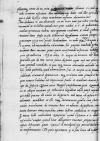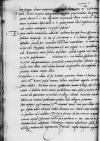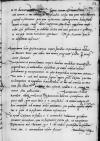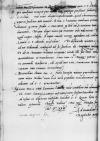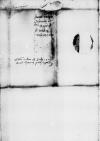Nihil gratius nobis istis temporibus accidere poterit, quam videre ⌊Bernardum⌋, Tuae Strenuitatis fratrem, cum litteris, ex quibus intelligere licuit, quaenam illius reditus mora fuerit. Nam ex tam longa mora et exspectatione aliquid sinistri, quod Deus avertat, timendum erat. Postquam autem Strenuitatis Tua scribit ex ⌊Lictoria(!)⌋ ad ⌊caesarem⌋ rediisse, ut cum illius maiestate in ⌊Italiam⌋ naviget, ingenti perfusae sumus gaudio et hanc suam profectionem rebus nostris apprime proficuam fore, in Italia enim multa occurrent, quae Tuae Strenuitatis prudentia, diligentia et fide indigebunt atque alio simili oratore, si Tua Strenuitas non adesset, opus foret. Quapropter boni optimique consulimus, quod potius hanc viam tenuerit Strenuitas Tua, quam quod recta per ⌊Galliam⌋ ad nos transiverit.
Ex multorum auctorum litteris edoctae sumus ⌊caesarem⌋ omnino deliberasse in ⌊Italiam⌋ traicere, quod Deus ipse faxit, sitque faustissimum et ex omni parte beatum, ut tot oborta incendia ex tanti principis adventu penitus exstinguantur et Cristianae reipublicae labanti perpetui stabilimenti spes optima resurgat.
Sed ad rem nostram. Scribit Strenuitas Tua nullas a nobis accepisse litteras neque a nostris officialibus in ⌊Ducatu Barensi⌋ exsistentibus, de quo non possumus non satis mirari, cum nos plures dederimus, tam per manus ⌊Velserorum⌋, quam ⌊Fucarorum⌋, sed viarum insecuritas et temporum malignitas inculpanda est. Nos Tuae Strenuitati scripsimus, ac etiam venerabili ⌊Ioanni Levicio⌋, quicquid nobis ex ⌊Ducatu Barensi⌋ perscriptum est, licet sero contingat audire, quae ibi geruntur, propter tam magnam locorum intercapedinem et plerumque citius de rei exitu, quam de initio audire solemus. Si quid igitur inibi erratum asseritur, non nobis impingi debet, sed illis officialibus, qui a fide ⌊caesaris⌋ citra mandatum nostrum aberraverint.
Non credimus tamen eos aberasse, si ea vera sunt, quae nobis scribuntur, verum tamen, ne in omnibus aequivocetur, cum scribit Strenuitas Tua de gubernatore malam opinionem haberi. Non ignorare credimus Strenuitatem Tuam gubernatorem ⌊Ducatus Bari⌋ fuisse et esse ⌊Octavianum Guidanum⌋, virum quippe integerrium et ex omni parte laudandum, in aula serenissimorum regum de Aragonia ab incunabulis educatum. ⌊Hic⌋ proprio vocabulo gubernator ⌊Ducatus Bari⌋ vocatur, penes quem ministrandi iustitiam subditis nostris potestas est ordinaria. Est et alter, dominus ⌊Scipio de Summa⌋, noster locumtenens generalis, qui de tota rerum summa disponit, aeque ac si nos praesentes essemus, cum generali mandato, in quo neque rerum alienatio includitur, neque criminis laesae maiestatis patratio, quod abominamur. Hic dominus ⌊Scipio⌋ si in servanda fidelitate erraverit, ignoramus, neque credimus eum potuisse errare, cum semper habitus sit caesarianus. Similiter et ⌊Nicolaus Maria⌋, suus frater, qui de consensu ⌊caesaris⌋ ⌊arcis Barensis⌋ praefecturam gerit. Quamobrem, si in aliquo erratum est, ⌊Octaviano Guidano⌋ nihil potest imputari, qui nihil poterat de summa rei disponere, sed totus ab ipsius domini ⌊Scipionis⌋ voluntate pendebat. Et ⌊ille⌋ tamquam locumtenens generalis cum ⌊fratre⌋ citra nostrum mandatum de ⌊Ducatu Bari⌋, ut voluere, disposuere, nam in tanta locorum intercapedine citius bellum confectum in ⌊Regno Neapolitano⌋, quam initia belli audivimus. Quapropter apud ⌊caesarem⌋ Strenuitas Tua nostrorum officialium causas, quoad licet, diligenter tueatur, praesertim ipsius {ipsius} ⌊Octaviani⌋, quem innoxium et inculpatum esse procul dubio tenemus et confirmamus. Et quia speramus, quod in hac hora ab eisdem officialibus nostris sufficientem Tua Strenuitas hab[ueri]t informationem, et quid in causis eorum et nostris agere debeat, eapropter longioribus insistendum non putamus.
Inter ceteras expeditiones, quas a ⌊caesare⌋ obtinuimus pro ⌊Ducatu nostro Barensi⌋, est una, qua cavetur, quod vacante praefectura ⌊arcis Barensis⌋ nos debeamus nominare aliquem virum nobilem, fidelem et gratum caesari, et per caesarem debeat confirmari. Nos nescimus, haec persecutio contra officiales nostros quorsum evadat, propterea sit cauta et vigilans Strenuitas Tua, quod si ⌊caesar⌋ vellet praefectum arcis mutare, aliquam causam in hunc modernum impingens, ex tunc suae maiestati caesareae supplicabit, dignetur suas litteras super hoc datas ratas habere et nobis gratiose concedere, quod praefectum arcis nominare possemus. Quod si annuerit, ex nostra parte Strenuitas Tua nominare poterit eundem ⌊Octavianum Guidanum⌋, qui semper habitus est erga serenissimos reges Aragonum fidelissimus, et totis viribus Strenuitas Tua contendet, ut huic bono viro ⌊arcis Barensis⌋ praefectura extradatur, quo nihil gratius nobis contingere posset. Nam tunc res nostrae in tuto collocatae essent. Hoc autem negotium Tuae Strenuitatis discretioni et prudentiae committitur, apud quam solum perpetuo silentio commendabitur.
Legimus, quae nobis Strenuitas Tua de adoha retenta et ⌊Ioannes Levicius⌋ scripserunt, et satis nobis molestum fuit tantas difficultates ac varietates audire, quae circa hoc obortae sunt. Speramus tamen et procul dubio tenemus Tuam Strenuitatem a ⌊caesare⌋ non digressuram, nisi hoc negotio ex animi sententia confecto planeque absoluto, ut in posterum nulla nobis difficultas ingeratur. Praeponderat enim multum potius ante tempus occurrere, quam post vulneratam causam remedium quaerere. Si ⌊caesar⌋ dicit se non exacturum, quemadmodum et ⌊rex catholicus⌋ felicis memoriae non exegit, firmet scriptura, [quo]d verbo dicit, suae maiestatis caesareae, tantumdem erit et nos in portu navigabimus, et quia quasi manibus tangimus, quanti faciat Strenuitas Tua hoc negotium, et quomodo illius cordi sit. Idcirco totum reicimus discretioni Strenuitatis Tuae, quam scimus illud effecturam, quod suis viribus attemptari et perfici poterit.
Et quia multis rationibus adductae credimus hac ipsa hora ⌊caesarem⌋ in ⌊Italiam⌋ traiecisse, si ita est, hortamur Strenuitatem Tuam a latere caesaris non discedat, quoad per secundas nostras litteras revocabitur. Si tantum temporis in horrida ⌊Hyspania⌋ absumptum est, non pigeat Strenuitatem Tuam tantillum temporis sub clementiori aura Italica exspectare, quoad negotia nostra omnia rite et recte perficiantur. Mittimus et Strenuitati Tuae litteras credentiales, quod si ⌊caesar⌋ ad coronationem processerit, prout processurum feliciter speramus, possit cum illius maiestate nostro nomine congratulari, ea supplendo, quae prudens orator censere debet.
Scripsimus Strenuitati Tuae alias et ⌊Ioanni Levicio⌋, quantum damni et iacturae super ⌊Statu nostro Barensi⌋ passae sumus, bellica necessitate urgente, et utinam finis adesset. Et inter cetera proventus ⌊Montis Sericoi⌋, qui non modici erant, a duobus annis omnes perdidimus. Nam cum ex pascuis et frumentis, ubi proventus arrendari et colligi soleant, imminente saevitia bellica, ne minimum quadrantem quidem inde colligere potuimus.
Fuit insuper post mortem illustrissimae dominae ⌊ducis⌋ una pars illius territorii per fiscum nobis adempta, nobis dicimus non citatis, non vocatis neque in iuribus nostris auditis. Et licet pluries de hac iniuria conquestae summus apud ⌊caesaream maiestatem⌋ per medium Strenuitatis Tuae, cui id in instructionibus nostris ad plenum dederamus, tamen in hactenus nihil fructus nihilque emolumenti reportamus. Proinde capta temporis opportunitate et tot damnorum nostrorum assumpto clypeo, sacram ⌊caesaream et catholicam maiestatem⌋ nostro nomine Strenuitas Tua adibit et supplicabit, ut haec tota pars nobis adempta gratiose restituatur. Pro qua restitutione et reintegratione huiusmodi ⌊Montis Sericoi⌋ magnifici domini ⌊supremi cancellarii⌋ auxilium implorabit, cui pellicium ex sabellis electis nostro nomine poterit Strenuitas Tua polliceri, si res ipsa suum sortietur effectum. Et ⌊Ioannem Levicium⌋ hac in re ad plenum informet.
Accepimus litteras confirmatorias super iuribus et privilegiis nostris in ⌊Ducatu Bari⌋, quae nobis non minus pergratae fuere, quam necessariae fuerant.
Accepimus et provisionem super duobus milibus ducatorum exigendorum ex rationibus fiscalibus ex causa adohae solutae. Curabimus, quod recuperentur, si istis temporibus recuperari poterint. Tuae vero Strenuitatis erit nostro nomine ingentes agere gratias ⌊caesari⌋ pro tanta benignitate et singulari benevolentia et nos ad similia et maiora pro illius maiestate paratas fore asserat eadem Strenuitas Tua, nosque memores fore polliceatur.
Accepimus et illas rotulas illosque mulierum Hyspanarum labores, exemplaria, forpices etc., quae suis litteris Strenuitas Tua complectitur, et omnia integra et bene composita ad manus nostras pervenere, pro quibus agimus ad praesens Tuae Strenuitati gratias et in posterum uberius refer{r}emus.
Si apud ⌊caesarem⌋ in ⌊Italia⌋ Strenuitas Tua remanebit, volumus, quod eadem fruatur provisione, qua in ⌊Hyspaniis⌋ potita est, et scripsimus ⌊thesaurario nostro Barensi⌋, quod Strenuitati Tuae de eadem provisione respondeat, sicut Tuae Strenuitati commodius visum fuerit. Mandavimusque insuper eidem nostro ⌊thesaurario⌋, ut illo[os quin]gentos ducatos, quos Strenuitas Tua a Velseris per cambium recepit pro reditu suo, e vestigio persolvat, habitis tamen Strenuitatis Tuae litteris. Sin vero aliquo impedimento, quod abominamur, ⌊caesar⌋ in ⌊Italiam⌋ non venerit et Tua Strenuitas ⌊Venecias⌋ incolumis pervenerit, volumus, quod omni studio Strenuitas Tua curet, quod litterae ad ⌊Levicium⌋ tuto perducantur. Et eam eligat viam, quae securior sibi videretur, et quid super adoha et super ⌊Monte Sericoi⌋ agendum sit, eidem ⌊Levicio⌋ Strenuitas Tua abunde perscribat. Et deficiente viatico Strenuitati Tuae ad nos redeunti, confugiat ad ⌊Ioannem Iacobum de Dugnano⌋, nostrum agentem, et ab eo ducentos ducatos accipiat, sicuti illi per litteras nostras committimus et mandamus. Nam cum CC-tis ducatis poterit Strenuitas Tua se commode traducere; ubi apud nos erit, tantorum servitiorum suorum non erimus immemores.
⌊Bernardum⌋ etiam, Tuae Strenuitatis fratrem, honesto viatico providimus et eum intra triduum cum litteris nostris expediri mandavimus, quo eo celerius ad Tuam Strenuitatem reverteretur.
Si cum Tua Strenuitate erit ⌊Levicius⌋, litterae nostrae ambobus sint communes, sin secus, litteras Levicio inscriptas cum instructionibus e vestigio ad ipsum, ut diximus, transmitti curabit Strenuitas Tua.
Quam bene et feliciter valere optamus.

